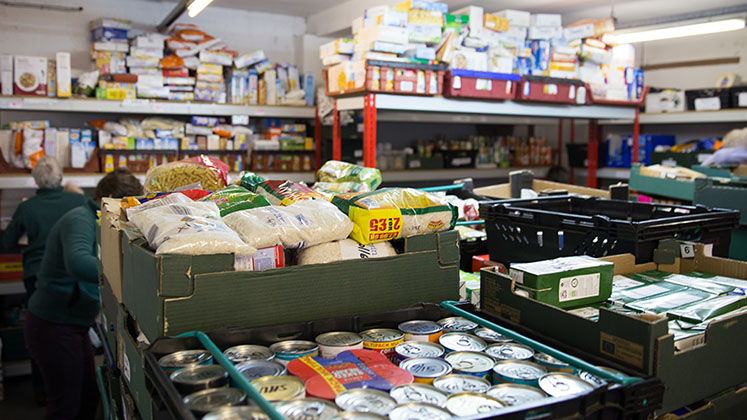Food insecurity is at an all-time high, Alt Cardiff investigates as organisations in Wales brace themselves for their busiest frosty season

“I am so worried about the coming winter, I know I don’t dare put my heating on,” says Heather, a foodbank beneficiary. She had to reduce her work hours due to ill health and since the cost of her energy bills went up, she chose to cut back on food and keep her heating off.
Heather’s story is just one of the many that Trussell Trust, a charitable organisation which supports a nationwide network of food banks in the UK, has come across. They house 1300 food bank centres which provide a minimum of three days’ emergency food parcels to those who are locked in poverty due to various reasons.
As per figures released early this year, almost 3 million emergency parcels were distributed by food banks across the UK between April 2022 and March 2023.
In Wales, this crossed over one hundred thousand which is a 41% increase in the number of parcels distributed from the same period in 2021 to 2022 and a 26% increase from when the pandemic peaked between 2020-2021.
According to industry experts, winter is the busiest season for food banks and other organisations which provide similar services. Trussell Trust expects this year’s winter to be the harshest ever in recent times, with food banks forecasted to distribute more than one million emergency food parcels in the UK between December 2023 and February 2024, “the equivalent of providing a parcel every eight seconds this winter”, says the report.
Is the weather to be solely blamed for this or are there more underlying factors contributing to the surge in demand for emergency food parcels?
ABCs of hunger
The first step to tackling this social issue is to understand what the term food insecurity means.
The Trussell Trust Hunger in the UK report defines food insecurity as “going without or cutting back on the quantity or quality of food due to lack of money.”
Lydia Lerner, Wales and South West regional manager at FoodCycle, an organisation which provides community meals across the UK, interprets food insecurity or poverty as the inability to afford nutritious food. “From our observations, this issue has impacted families, the elderly, children, the homeless, disabled and is not limited to or confined to any particular demographic, gender or region. We see real people whose lives have been affected,” she said.
A free food parcel can offer a crucial breathing gap that people badly need
Liz Davies
Whys and hows
Liz Davies, operations manager at Cardiff Food Bank identifies the top three reasons why people approach their nearest food banks.
“Rising cost of essentials, debt due to priority payments like council tax, energy bills, rent or mortgage and ongoing effects of physical and mental conditions are primarily why people access us. Any of these causes worry and anxiety which can further aggravate their mental or physical well-being, creating a spiral effect of problems. In such circumstances, a free food parcel can offer a crucial breathing gap that people badly need,” she explains.
The Bevan Foundation, a Welsh think-tank, captures the extent of hardship in Wales caused due to the cost-of-living crisis in their Snapshot of Poverty survey. The latest findings show that one in eight households are struggling to afford essentials like housing, food, fuel, clothing and transport.
The survey also highlights that the impact of rising prices is unequal.
21% of respondents living in households with a child reported that they had to cut back on the size of the child’s meal or that their child had been forced to skip a meal.
Adults under the age of 65, disabled individuals, people on receipt of benefits like the Universal Credit and unpaid carers, are other groups who are more likely to struggle to afford the basics as against the general population.
While discussions have been raging about bringing down these stark figures, the numbers which rose during Covid-19 have since then only gotten worse.
Food Cardiff, a city-wide partnership of organisations and people working to promote healthy and environmentally sustainable food, led the Covid-19 food response task group in 2020. Pearl Costello, head coordinator at the firm, shares how it has become more challenging today to secure support to tackle the issue.
“There were logistical and financial difficulties during the pandemic, but I feel like there was better support too. Major charities and businesses, especially those in the hospitality sector that were shut down and couldn’t operate, donated quick meals to the NHS. The figures are now rising, with less direct backing and funding,” she said.
The way ahead
Davies underlines the fact that providing food parcels is just “sticking the plaster” on the larger issue. “We are not just working on giving food to people but looking at how we can get help for them. That is why we have the whole process of getting a food meal through vouchers in place,” she says.
Care professionals like health visitors, school staff and social workers identify people in crisis and issue food vouchers. These can be used to access nutritionally balanced non-perishable food items like cereal, soup, tinned meat and vegetables, at the nearest food banks.
This helps to keep a record of the ground reality of how and why people end up in challenging circumstances. More importantly, individuals are then referred to other agencies like the Money Advice Service or the council who can potentially help them resolve their particular problem.

“Our society is pretty broken at the moment. Interest rates are high and the length and time for which some people have to wait with a health issue is alarming. Food poverty is, therefore, a complex problem with no ‘one’ solution. Spending money on identifying root causes, instead of multiple projects may be one way to go ahead with this,” she opines.
This is also why the organisation has started a ‘Guarantee Our Essentials’ petition ahead of the next general election, calling on all UK political party leaders to guarantee that the universal credit payment covers the costs of essentials.
Winter is coming
An urgent Christmas appeal has been put out by Trussell Trust, asking for donations as more families in the UK are anticipated to make their first visit to the nearest food bank this winter.
Cardiff Food Bank has created a reverse advent calendar this year for people to offer donations in a festive way. The listed food items will be sorted and packed into emergency food parcels while the financial donations will be utilised to store and distribute these safely. Special Christmas hampers are being prepared with mince pies, puddings and ham, with treats for children in addition to ordinary parcels.
Food banks are joined in by other charities who pledge to do their absolute best to serve the community no matter the increase in demand for meals.
FoodCycle meals, for example, are prepared for 30-35 guests at a time but winter months are busier. “If it means we have to run to the nearest supermarket to feed more guests, we will happily do so,” smiles Lerner.
For people like Heather, winter is not ‘the most wonderful time of the year.’
Offering a warm shelter to all of them may not be possible, but a hot meal on a cold day will undoubtedly warm their hearts.
Food poverty is an issue that needs immediate attention. But how bad are the numbers? Find out here:
Ways to access free food this winter:
- Food banks: Head over to the Money Advice Hub to get food bank vouchers. These can also be issued by your GP and social workers
- FoodCycle: Pop into one of the community dining events hosted by the charity at Cardiff Riverside, Ely, Newport and Bristol
- Olio app: Download the app, and look for surplus food items listed by others. Request the same and collect from the location
- Healthy Start: A scheme to help expectant mothers and their children. If you qualify as per the conditions, you can get free vitamins, and vouchers towards the costs of milk, vegetables and fruit. Apply here
